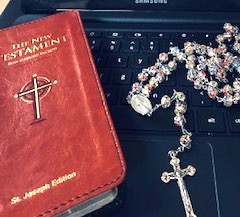What is a genre?
It is a category, a definition that files your book into an accepted compartment or sort.
Why is genre important?
Because there are specific rules for each genre. Word counts, plots, marketing, and publication all depend on the kind of genre you write. That’s not to say that an author can’t write in a few different genres but you will usually find success in one specific genre that your readers come to expect of you.
Can you imagine Louise Penny writing a Christian romance novel? She probably could but wouldn’t that be a surprise or disappointment for her fans. I started writing magazine articles and novels. Both found some success, but my real success came from writing children’s books.
Now, while I enjoy stretching my talent by trying new genres, I know that both my financial and reputational success is in the genre of children’s books.
In the Catholic Writer’s Guild, we have all kinds of genres and many talented writers. And while we all have a Catholic, Christian, or just a moral flavor to our work, our books and stories encompass a rich variety of talent. It may take you a few experiments to find the most successful genre for you, but once you do you will find your writing both personally and professionally satisfying.
What is the list of genres?
Here are a few:
Commercial fiction – Is the kind of fiction that is easy to explain. It is of high quality and encompasses the well-known bestsellers that include woman’s fiction and books that appeal to the general public. Some examples are many books that are made into movies. An example would be all of Nicolas Sparks’ books or Gone Girl by Gillian Flynn. They are very popular with fans and publishers alike.
Literary fiction – Is extremely well-written with elevated language. It is not easy to read and takes some time and thought. It includes the classics as in all of Dickens’ novels. Some others are books that have social relevance such as The Handmaid’s Tale or The Kite Runner. These are hard to sell and therefore hard to get published and many literary and extremely talented authors have numerous rejection slips before they find success.
Genre fiction – includes science fiction. Fantasy, romance, urban fiction, crime, thriller, horror, etc. One of our most talented science fiction writers is Karina Fabian who is a member of our Guild. Historical Romance is done with great talent by Ellen Gable, who has also won numerous awards. Mystery writing by Erin McCole Cupp include Vanished and my favorite Don’t you forget about me. So you see, even though we write from a Catholic or moral perspective, we still write in specific genres. The genres in the CWG are endless. There are gifted writers in the guild who produce books for children of all ages and YA for teenagers. I write a series of chapter books for children from 7-12.
Genre Non-fiction This category can be for any age. It includes Memoir, both commercial and literary, Self-Help/ How to books such as Patrice Fagnant- MacArthur’s The Power of Forgiveness or Father Calloway books like How to Pray the Rosary.
Why pick a genre and find your passion?
Because publishers have specific categories of books and when you send your first query letter into a publisher, it’s best to know what genre and age your work fits. You need to know the accepted word count, style, and need for your specific style of writing. If you don’t think you fit into a category, just try writing that first query letter to a publisher or marketing your book. In our next blog, we’ll continue our discussion of genre, especially the children’s book requirements.

Thank you for writing this series. Looking forward to the next one.
Thanks so much for mentioning my book!